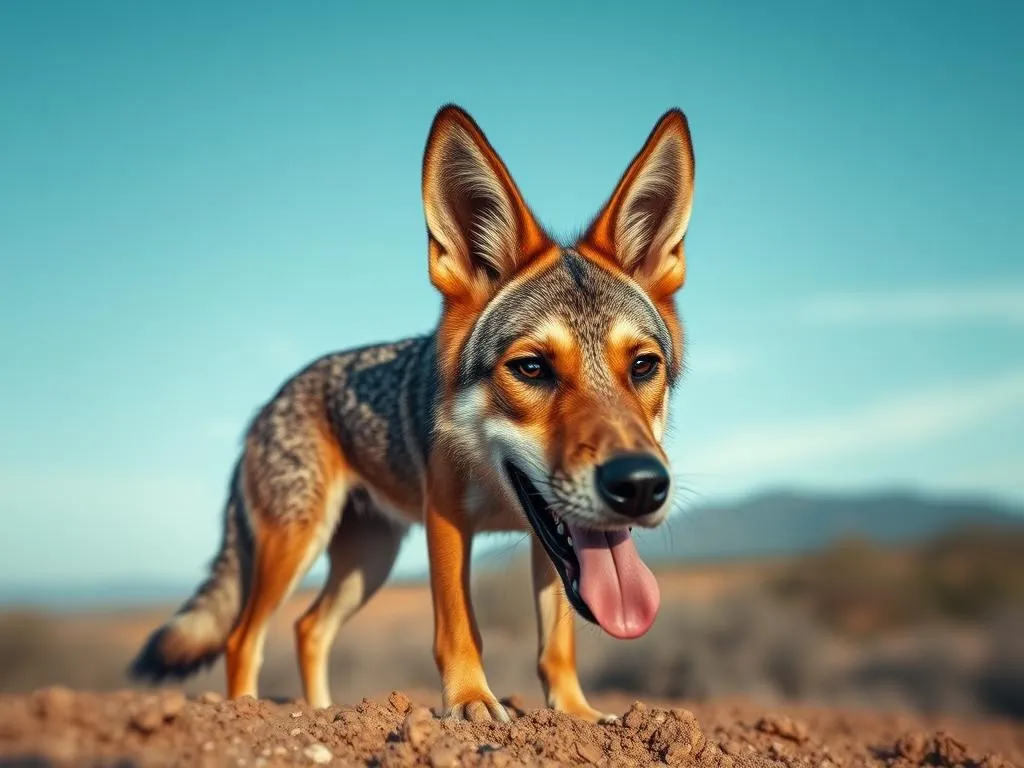
The idea of mixing a coyote with a domestic dog is both fascinating and perplexing to many. These hybrids, known as coydogs, have captured the imagination of pet enthusiasts and animal behaviorists alike. The curiosity surrounding the existence of coyote dog mixes brings us to explore their characteristics, implications, and the intriguing nature of these unique creatures.
Understanding Coydogs
Definition of Coydogs
A coydog is defined as a hybrid resulting from the mating of a coyote (Canis latrans) and a domestic dog (Canis lupus familiaris). Unlike purebred dogs, which are intentionally bred for specific traits, coydogs come about through natural or accidental breeding in areas where coyotes and domestic dogs coexist. The term “coyote” refers to a wild canid native to North America, known for its adaptability and intelligence.
Coyote and Dog Characteristics
Coyotes possess unique traits that differentiate them from domestic dogs. Coyotes are generally leaner, with long legs and a bushy tail, and they have a keen sense of smell and hearing. Their coat is typically tan or gray, featuring a mix of colors depending on their environment. Coyotes are known for their wild instincts, often exhibiting behaviors such as hunting and territorial marking.
On the other hand, domestic dogs vary widely in appearance and temperament, largely influenced by their breed. From the robust German Shepherd to the playful Golden Retriever, dogs are bred for companionship, work, and various tasks. While dogs are generally more social and trainable, coyotes are more independent and wary of humans.
Historical Context
The interaction between coyotes and dogs is not a new phenomenon. Historically, coyotes have adapted to human encroachment, often scavenging near human settlements. In various cultures, coyotes hold a significant place in mythology and folklore, often depicted as tricksters or symbols of cunning. The blending of coyote and dog characteristics can be traced back centuries, though the modern hybridization that leads to coydogs is a more recent occurrence.
The Existence of Coyote Dog Mixes
Are Coydogs Real?
The question of whether coyote dog mixes exist can be answered affirmatively. Scientific studies have confirmed that coyotes and domestic dogs can interbreed, resulting in viable offspring. Instances of successful breeding between coyotes and domestic dogs have been documented, particularly in regions where their habitats overlap. This hybridization is sometimes encouraged in controlled environments for research purposes, but it often occurs naturally in the wild.
Common Coyote-Dog Breeds
Certain dog breeds are more likely to hybridize with coyotes due to their size, temperament, and behavior. Common breeds that have been known to produce coydogs include the German Shepherd, Alaskan Malamute, Siberian Husky, and Border Collie. These breeds often share physical traits and behavioral characteristics that make them more compatible with coyotes. For instance, their size and energy levels can match those of a coyote, facilitating natural mating.
Geographic Distribution
Coydogs are more commonly found in regions where coyote populations are dense and where domestic dogs are allowed to roam freely. Areas such as rural and suburban communities, particularly in the western United States, are hotspots for coydog hybrids. Urbanization has significantly affected coyote populations, leading them to adapt to city life, which in turn increases their interaction with domestic dogs. This interplay raises concerns about the potential for hybridization.
Characteristics of Coydogs
Physical Traits
Coydogs typically inherit a blend of physical characteristics from both parents. They tend to be medium to large-sized dogs, with a lean and muscular build resembling that of a coyote. Their coat may vary widely, often featuring a mix of colors such as gray, brown, and tan. Unlike many domestic dogs, coydogs often have longer legs and larger ears, contributing to their wild appearance.
Behavioral Traits
The behavioral tendencies of coydogs can be unpredictable. They often exhibit a mix of coyote instincts and domestic dog behaviors. Coydogs may display heightened prey drive, territoriality, and a strong instinct to roam. Training can be challenging, as they may inherit the coyote’s independent nature, making them less responsive to commands compared to typical domestic dogs. Socialization from a young age is crucial to help them adapt to human environments.
Health Considerations
Coydogs benefit from genetic diversity, which can potentially lead to fewer hereditary health issues compared to purebred dogs. However, they may also inherit health problems from both parent species, including hip dysplasia, eye conditions, and behavioral issues. Regular veterinary check-ups and a proper diet are essential for maintaining their health.
Legal and Ethical Considerations
Legality of Owning a Coydog
The legality of owning a coydog varies significantly across different regions. In some states, it is permissible to own hybrids, while others may have strict regulations or outright bans on coydog ownership. Laws often depend on the percentage of coyote genetics present in the animal. Prospective owners should thoroughly research local regulations before considering a coydog as a pet.
Ethical Considerations
The hybridization of coyotes and domestic dogs raises several ethical concerns. Animal welfare advocates argue that breeding hybrids can lead to unpredictable behaviors and challenges in training, which may result in abandonment or neglect. Additionally, the impact on wildlife conservation is significant; coydogs can compete with native wildlife for resources and potentially disrupt local ecosystems. Responsible ownership and breeding practices are crucial to mitigate these issues.
Caring for a Coydog
Training and Socialization
Training a coydog can be a daunting task. Due to their strong instincts and independent nature, traditional training methods may not yield the desired results. Positive reinforcement techniques are often recommended, focusing on reward-based training to encourage desired behaviors. Early socialization is crucial to help them interact positively with people and other animals. Exposure to various environments and experiences can help shape their behavior positively.
Diet and Nutrition
Coydogs have specific nutritional needs that may differ from those of domestic dogs. A high-quality diet rich in protein is essential to support their active lifestyle. Owners should consider a diet that includes meat, vegetables, and whole grains, ensuring they receive the necessary vitamins and minerals. Consulting with a veterinarian can help tailor a diet that meets the unique needs of a coydog.
Exercise and Enrichment
Due to their wild ancestry, coydogs require significant physical and mental stimulation. Daily exercise is essential to prevent boredom and destructive behaviors. Activities such as hiking, running, and engaging in interactive play are beneficial. Mental enrichment, including puzzle toys and training exercises, can help satisfy their intelligent and curious nature. A well-exercised coydog is likely to be happier and more well-adjusted.
Conclusion
The existence of coyote dog mixes—or coydogs—opens up a world of curiosity and complexity. While these hybrids may possess unique characteristics, they also bring forth a host of challenges related to training, health, and ethical considerations. Prospective owners must weigh the implications of introducing such a hybrid into their lives carefully. Understanding the balance between the wild instincts of coyotes and the domesticated traits of dogs is key to fostering a healthy relationship with these extraordinary animals. Responsible ownership and a commitment to their well-being are essential for anyone considering welcoming a coydog into their home.









